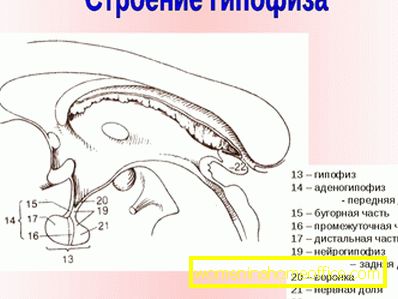What the pituitary gland is responsible for
Today many people know about the existence of the pituitary gland in the human body. However, not everyone knows what this gland is responsible for. At the same time, its proper functioning ensures the normal functioning of all internal organs. What is the pituitary gland responsible for and why is it so important to the human body?
What does the pituitary gland consist of?

The pituitary gland is a gland in the endocrine system, which plays an important role in the maintenance of human life. It is located under the cerebral cortex in front of the head and is protected from hitting the bones of the skull.
Despite the fact that this organ is about the size of a pea, and its weight is only 0.5 g, it allocates anterior and posterior lobes, each of which has its own purpose.
The posterior lobe, which is also called the neurohypophysis, produces 2 hormones - oxytocin and vasopressin. The role of oxytocin is in the reduction of muscle tissue; women he helps in childbirth, giving a signal to the beginning of labor. He is also responsible for feeding milk from the mammary glands.
Vasopressin retains water in the body. Thanks to him, dehydration does not occur. This hormone also helps to eliminate sodium salts from the kidneys.
Adenohypophysis (anterior lobe) performs a different function: it produces protein hormones, without which normal metabolism is impossible. These derivatives include:
- gonadotropic - responsible for the production of sex hormones in both sexes;
- Prolactin - produces breast milk in women during the period of feeding a child;
- thyrotropic - affects the functioning of the thyroid gland;
- somatotropin - responsible for body parameters;
- adrenocorticotropic - stimulates the adrenal glands.
Next to the pituitary gland is the hypothalamus (intermediate section of the brain). It is closely related to the endocrine gland and is responsible for the production of statins and libertines. These are substances that regulate the flow of hormones into the blood. The neurons of this part of the brain are sensitive to any changes in our body.
The pituitary gland is still not fully studied organ medicine. Doctors still do not know the exact number of functions that he performs, as well as the list of hormones, the production of which he regulates.
Diseases of the pituitary gland

A healthy pituitary gland is a guarantee of human health and longevity. But sometimes it happens that deviations develop in the pituitary gland of the brain. In this case, the balance of hormones in the body is disturbed. Depending on how much hormonal compounds are produced, there is an excess or deficiency.
Impaired pituitary function entails the appearance of endocrine diseases. If the amount of hormones is not enough, the following pathologies may occur:
- hypothyroidism, malfunction of the thyroid gland (thyroid gland activity decreases, a person constantly gets tired, feels weak in the hands, headaches, nails become brittle, the skin becomes dry, the mood worsens);
- growth retardation, dwarfism (the disease begins to manifest itself in children by 2-3 years old; treatment started on time will allow it to stop and ensure normal growth; in adulthood such people will have to take sex hormones);
- delayed sexual development, problems with sexual function in adults (in particularly severe cases, atrophy of the testicles or ovaries occurs in women);
- diabetes (the main symptoms are thirst and frequent urination).
Excess hormones are no less dangerous. In this case, such diseases develop:
- hypertension (characterized by increased blood pressure);
- mental disorders;
- infertility (may occur due to a high level of the hormone prolactin, as a result of which milk is secreted from the glands in both women and men);
- excessive growth (such patients reach 2 m in adulthood, but rarely live to old years due to numerous complications; gigantism develops against the background of an overgrowth of growth hormone);
- Itsenko-Cushing disease (characterized by excessive weight, high pressure, low immunity, sterility, women can grow a mustache).
Diseases of the pituitary gland can be the result of a head injury. Perhaps the most common is pituitary adenoma.
Adenoma - what is it?

Adenoma is a tumor that, as it grows, begins to put pressure on the glandular tissue. Along with metabolic disorders, patients suffer from other symptoms:
- headaches;
- disturbance in the movement of the pupil;
- changes in the field of view.
Adenoma up to 2 cm in size is not removed. If you properly carry out its treatment, the tumor will not grow and will not lead to poor health. Adenoma more than 2 cm to be removed surgically.
To determine the stage of the tumor is scheduled examination, including MRI. If the adenoma is benign, a medical treatment is performed, which is combined with the use of radio waves. In the early stages of the disease, the prognosis is often favorable. In special cases, the use of radiation therapy.
If the adenoma was found in a pregnant woman, treatment is not carried out. Doctors control the state of the tumor, and the therapeutic course is prescribed only after delivery.
Treatment of hormonal disorders
Since diseases of the pituitary gland are directly related to the production of hormones, most often, drugs that increase or suppress the production of certain hormonal compounds are prescribed as a course of therapy.
There are no popular methods for the treatment of diseases of the pituitary gland. They are influenced only by rigid methods of hormonal therapy or surgery. Do not hope that herbs or other drugs can improve hormones. It is possible that for some time they will hide certain symptoms, but it will not be possible to eliminate the cause of the disease with folk remedies.
Awareness of what the pituitary gland is responsible for will help in time to associate some of the alarming symptoms and conditions with impaired function of this organ and to begin treatment. A timely therapy will improve the quality of life and restore health.